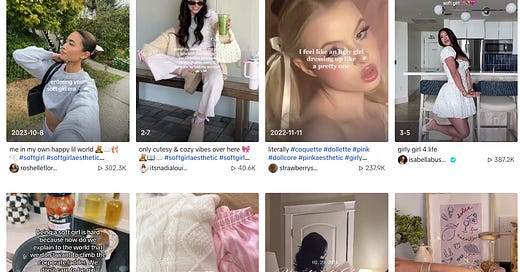Before we get started: there are so many fun new features being added in 2025 (including office hours where I can answer all of your questions), so if you want to lock in the current pricing and level up your support for this newsletter, now is the time to become a paid subscriber or give a gift subscription to a friend so you can talk about me behind my back.
I am also doing personalized copies of Everyone is Lying to You (the greatest tradwife murder mystery of all time) when you order from Bluebird Bookshop. I promise I’ll make them hilarious.
The Internet has been all aflutter about a BBC piece this week on how soft girls (women who are checking out of the workforce to be supported by their boyfriends) are starting to appear in Sweden.
There has long been a word for a woman who doesn’t work outside the home who collects a salary from a male paramour to “keep” her “taken care” of.
Courtesan.
This isn’t a new job at all. In fact some of the most brilliant and powerful women in history took on the job, mainly because for too long women weren’t allowed to do much else. I’m reading the biography of Pamela Harriman right now, quite possibly the most powerful courtesan of the 20th Century (she used her time spent with politically powerful men during the second World War to help Winston Churchill (her father-in-law secure a victory for the British, among many other political coups). Spoiler….I’m starting to think Pam Harriman might need to be a future novel subject.
As women we need to do whatever it takes to survive and thrive in this world. But I do think that we should identify these trends of soft girls (girlfriends who check out of the workforce to have their lives paid for by a boyfriend) for what they are. Also there’s nothing soft about laboring to serve a man. It’s gonna get hard eventually ladies. The name soft girl is a misnomer.
Not all soft girls take payments from their boyfriends. Some of them seem to have parental support. Some make money from talking about being soft on social media.

 Tiktok failed to load.
Tiktok failed to load.Enable 3rd party cookies or use another browser
As I’ve written about before soft girl is often the gateway to trad wife.
The soft girl trend definitely started here in America and I am fascinated that it is being exported to the rest of the world, especially Sweden—land of gender equality and truly excellent parental leave.
In a plot twist that would make their feminist forebears raise an eyebrow, young Swedish women are turning away from the workforce. Welcome to the world of "hemmaflickvän," Swedish for stay-at-home girlfriend.
The BBC recently did a piece on these so-called Swedish soft girls. Here’s a taste:
Why are young women embracing a social media trend that celebrates quitting work?
Vilma Larsson, 25, previously had jobs in a grocery store, a care home and a factory. But she quit work a year ago to become a stay-at-home-girlfriend, and says she’s never been happier.
 Tiktok failed to load.
Tiktok failed to load.Enable 3rd party cookies or use another browser
“My life is softer. I am not struggling. I am not very stressed.”
Her boyfriend works remotely in finance, and while he spends his days on his laptop, she’s at the gym, out for coffee, or cooking. The couple grew up in small towns in central Sweden, but now travel a lot, and are spending the winter in Cyprus.
“Every month he gives me a salary from his money that he made. But if I need more, I'll ask him. Or if I need less, I don't - I just save the rest,” explains Ms Larsson.
But here's where it gets interesting: this isn't happening in just any country. This is SWEDEN – the gender equality heavyweight champion of the world, with five decades of dual-income household policies under its belt. The same Sweden that's been pushing for workplace equality since before many of these "soft girls" were born.
Check out this piece on paternal leave for more info.
The trend has caught the attention of Ungdomsbarometern, Sweden's premier youth survey, highlighting a fascinating generational shift. Young Swedes, ages 15-24, are increasingly predicting this lifestyle will gain momentum, suggesting we might be witnessing not just a TikTok trend, but a genuine cultural movement.
This raises the same questions it does here in the states. Is this a rebellion against the pressure to "have it all," or simply a new expression of freedom – the freedom to choose traditional roles in a modern context? And is this the end of feminism as we know it?
Keep reading with a 7-day free trial
Subscribe to Over the Influence to keep reading this post and get 7 days of free access to the full post archives.








